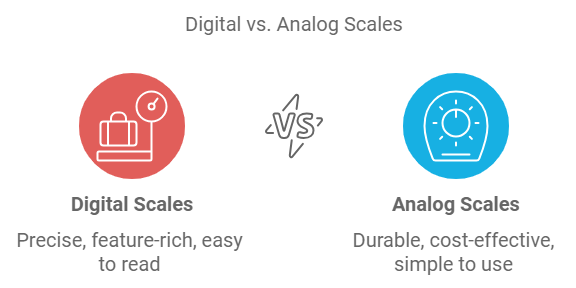Analog vs Digital Scale: 7 Key Differences
Choosing between the best analog vs digital scale can significantly impact your weighing experience. Whether you’re outfitting a home bathroom or a professional kitchen, understanding the key differences will help you make an informed decision.
- Accuracy: Digital scales provide precise readings with decimal places. Analog scales require estimation based on needle position.
- Technology: Digital scales use electronic sensors. Analog scales rely on spring mechanisms.
- Durability: Analog scales are generally more durable. Digital scales may be sensitive to environmental factors.
- Cost: Analog scales are typically less expensive. Digital scales often have a higher upfront cost.
- Ease of Use: Digital scales offer clear numerical displays. Analog scales require manual reading of the dial.
- Features: Digital scales may include unit conversion and mobile connectivity, while analog scales usually offer basic weight measurement only.
- Calibration: Both types need regular calibration and even surfaces for accurate readings.

You can find the best analog scales reviewed here and the best digital scales here!
Practical Applications
Understanding the strengths and weaknesses of each type of scale can help you choose the one that best suits your needs.
For Home Use:
Digital scales are increasingly popular for home bathrooms due to their ease of use and precision. They’re particularly useful for those tracking weight loss or gain, as they can detect small changes more accurately. However, analog scales remain reliable for those who prefer simplicity and don’t require decimal-point accuracy.
In the Kitchen:
Digital scales offer significant advantages for cooking and baking. Their ability to measure in small increments is crucial for recipes that require precise measurements. Many digital kitchen scales also offer tare functions and unit conversions, making them versatile tools for amateur and professional chefs.
Professional Settings:
Digital scales are often preferred in medical offices, gyms, and scientific laboratories for their accuracy and data-recording capabilities. However, some professionals still rely on analog scales for their durability and reliability, especially in environments where electronic devices might be compromised.
Maintenance and Care
Regardless of the type of scale you choose, proper maintenance is key to ensuring long-term accuracy and functionality.
For Digital Scales:
- Keep batteries fresh to avoid inaccurate readings
- Clean the surface regularly with a soft, damp cloth
- Avoid exposing the scale to extreme temperatures or humidity
- Store in a dry place when not in use
For Analog Scales:
- Check the spring mechanism periodically for wear
- Keep the dial clean and free from dust
- Ensure the scale remains level for accurate readings
- Avoid overloading beyond the scale’s capacity
Making Your Decision
When deciding between analog vs digital scale, consider the following:
- Intended Use: Are you using it for personal weight tracking, cooking, or professional purposes?
- Accuracy Needs: Do you require precise decimals, or are approximate readings sufficient?
- Budget: How much are you willing to invest in a weighing device?
- Technological Comfort: Are you comfortable with digital interfaces, or do you prefer the simplicity of analog dials?
- Longevity: Consider the expected lifespan and durability requirements for your specific situation.
By carefully weighing these factors, you can select the scale that best fits your needs, ensuring accurate measurements and satisfaction with your purchase for years to come.


